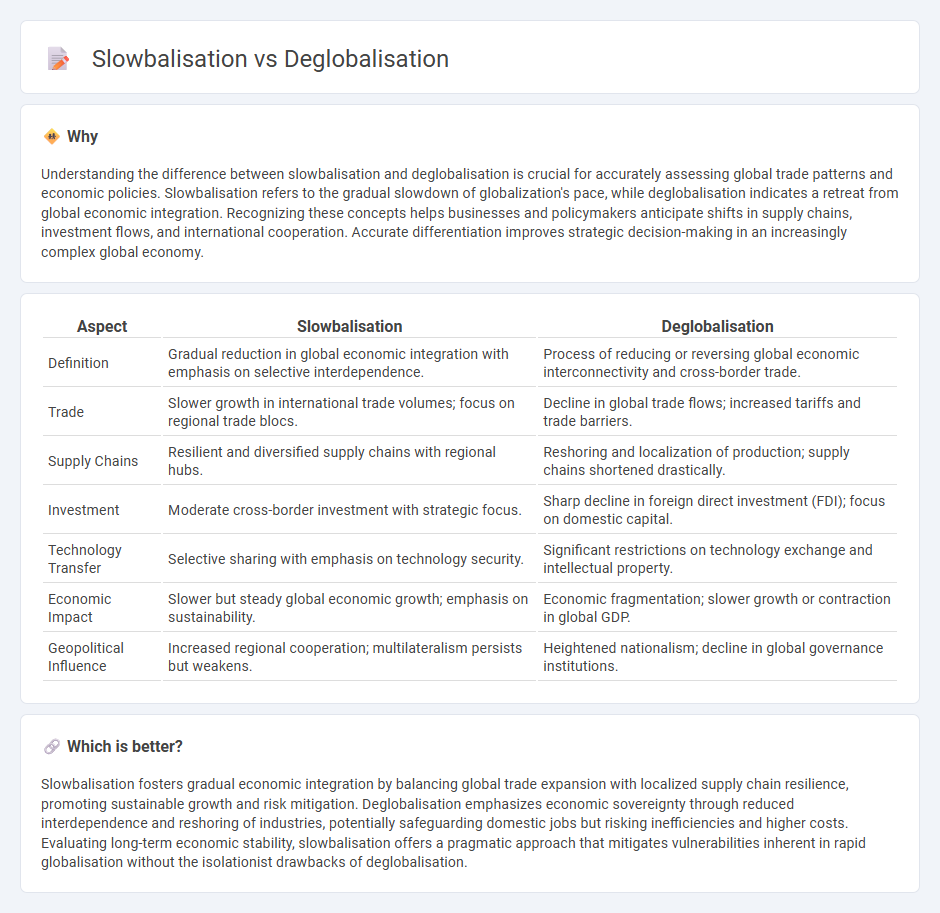
Slowbalisation describes the gradual reduction in the pace of global economic integration, reflecting shifts in trade growth, supply chain diversification, and regional partnerships. Deglobalisation, by contrast, involves a more pronounced retreat from globalization, characterized by increased protectionism, reshoring of manufacturing, and barriers to cross-border capital flows. Explore the distinctions and impacts of these trends on global markets and economic policy.
Why it is important
Understanding the difference between slowbalisation and deglobalisation is crucial for accurately assessing global trade patterns and economic policies. Slowbalisation refers to the gradual slowdown of globalization's pace, while deglobalisation indicates a retreat from global economic integration. Recognizing these concepts helps businesses and policymakers anticipate shifts in supply chains, investment flows, and international cooperation. Accurate differentiation improves strategic decision-making in an increasingly complex global economy.
Comparison Table
| Aspect | Slowbalisation | Deglobalisation |
|---|---|---|
| Definition | Gradual reduction in global economic integration with emphasis on selective interdependence. | Process of reducing or reversing global economic interconnectivity and cross-border trade. |
| Trade | Slower growth in international trade volumes; focus on regional trade blocs. | Decline in global trade flows; increased tariffs and trade barriers. |
| Supply Chains | Resilient and diversified supply chains with regional hubs. | Reshoring and localization of production; supply chains shortened drastically. |
| Investment | Moderate cross-border investment with strategic focus. | Sharp decline in foreign direct investment (FDI); focus on domestic capital. |
| Technology Transfer | Selective sharing with emphasis on technology security. | Significant restrictions on technology exchange and intellectual property. |
| Economic Impact | Slower but steady global economic growth; emphasis on sustainability. | Economic fragmentation; slower growth or contraction in global GDP. |
| Geopolitical Influence | Increased regional cooperation; multilateralism persists but weakens. | Heightened nationalism; decline in global governance institutions. |
Which is better?
Slowbalisation fosters gradual economic integration by balancing global trade expansion with localized supply chain resilience, promoting sustainable growth and risk mitigation. Deglobalisation emphasizes economic sovereignty through reduced interdependence and reshoring of industries, potentially safeguarding domestic jobs but risking inefficiencies and higher costs. Evaluating long-term economic stability, slowbalisation offers a pragmatic approach that mitigates vulnerabilities inherent in rapid globalisation without the isolationist drawbacks of deglobalisation.
Connection
Slowbalisation and deglobalisation are connected through their shared impact on the reduction of global trade growth and cross-border investments, reflecting a shift from rapid economic integration to more localized economic patterns. Both trends result from rising protectionism, geopolitical tensions, and supply chain disruptions, which cause countries to prioritize self-sufficiency and regional trade agreements over globalisation. The decline in global value chains and multinational cooperation under slowbalisation accelerates the retreat from global interconnectedness characteristic of deglobalisation.
Key Terms
Trade Barriers
Trade barriers during deglobalisation typically increase as countries impose tariffs, quotas, and restrictive regulations to protect domestic industries, resulting in reduced international trade volumes. Slowbalisation maintains a more balanced approach, with moderate trade barriers that encourage regional trade agreements and gradual supply chain diversification rather than abrupt trade restrictions. Explore the impact of these contrasting trade barrier strategies on global commerce for a deeper understanding.
Supply Chains
Deglobalisation emphasizes shortening supply chains by increasing local production and reducing reliance on international suppliers, aiming to enhance resilience against global disruptions. Slowbalisation reflects a moderated approach, where supply chains remain interconnected but grow at a slower pace, prioritizing stability over rapid expansion. Explore the impacts of these trends on global trade and manufacturing for a deeper understanding.
Economic Integration
Deglobalisation reflects a retreat from worldwide economic integration marked by rising trade barriers, reshoring of production, and declining cross-border investment flows. Slowbalisation, in contrast, signifies a gradual slowdown in global economic interdependence while maintaining interconnected supply chains and sustained international collaboration. Explore deeper insights into how these contrasting trends reshape global markets and trade policies.
Source and External Links
Deglobalization - Wikipedia - Deglobalization is the process of diminishing interdependence and integration between nation-states, marking periods when trade and investment decline, contrasting with globalization; notable periods occurred in the 1930s and 2010s, and it covers economic, political, social, and cultural dimensions.
What is deglobalization? | Chatham House - Deglobalization is a movement toward less global connectivity, emphasizing powerful nation states, border controls, and local solutions, spurred by phenomena like Brexit, populism, and geopolitical conflicts, but global challenges keep some degree of international cooperation relevant.
Deglobalisation: what you need to know - The World Economic Forum - Recent global shocks like the COVID-19 pandemic, the war in Ukraine, and the climate crisis are accelerating a shift from 'slowbalisation' to deglobalisation, with governments and companies seeking resilience by reducing reliance on far-flung supply chains and focusing on trusted partners.
 dowidth.com
dowidth.com